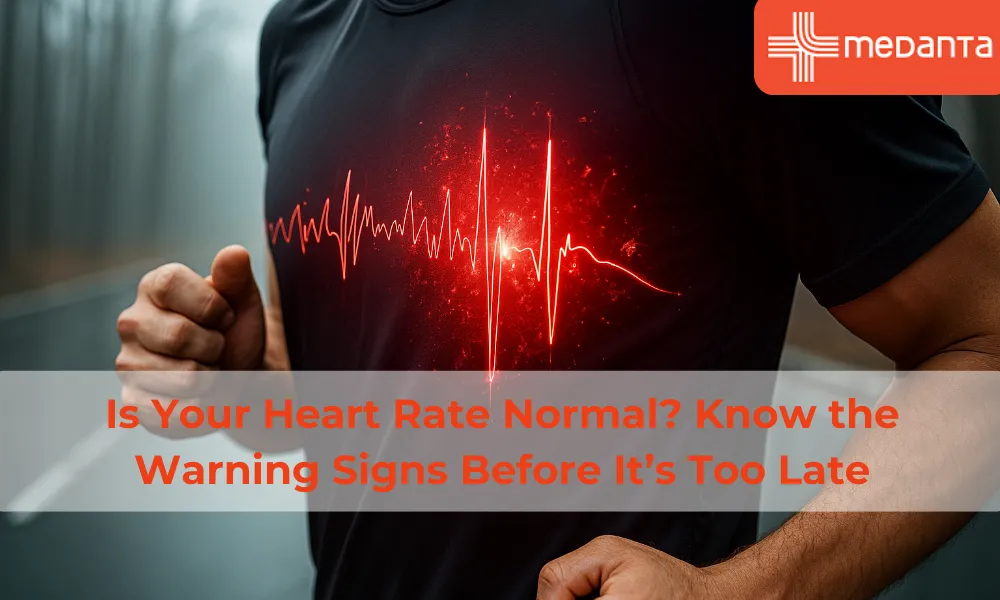Is Your Heart Rate Normal? Know the Warning Signs Before It’s Too Late

TABLE OF CONTENTS
Your pulse rate tells significant information about your heart's health. Most adults have a healthy resting heart rate between 60 and 100 beats per minute. The range for healthy adults typically falls between 55 and 85 beats per minute.
The sensation of your heart racing while sitting quietly might worry you. Medical attention becomes necessary if your resting heart rate stays above 90 beats per minute. Non-athletes should be aware that a heart rate below 60 beats during waking hours could indicate bradycardia. Your heart might need attention if you experience warning signs such as chest pain, unusual fatigue, or shortness of breath. Chest pain is the most common indicator of restricted blood flow to the heart or a heart attack.
This article explains the meaning of a normal heart rate, the proper way to check your pulse, and the right time to get medical help. The difference between normal variations and dangerous signs could save your life.
What Is a Normal Heart Rate?
Your heartbeat shows how many times your heart contracts each minute. A good grasp of your normal pulse rate lets you track your heart's health and catch problems early.
Normal Resting Heart Rate by Age Group
In children:
Kids have faster heart rates than adults.
A newborn's heart beats 100-205 times per minute (bpm), and infants' rates range from 100-180 bpm. The pulse slows down as we age:
Toddlers: 98-140 bpm
Preschoolers: 80-120 bpm
School-aged children: 75-118 bpm
Teens: 60-100 bpm
In adults:
A healthy adult's resting heart rate typically falls between 60-100 bpm. Many doctors think the ideal range sits closer to 55-85 bpm.
Different factors can change this number. Athletes often have heart rates in the 40s because their heart muscles are stronger. A rate that stays above 90 bpm needs medical evaluation.
How to Measure Your Heart Rate Correctly
Here's how to check your pulse the right way:
Rest for at least 5 minutes
Put two fingers (not the thumb) on your wrist below your thumb's base
Count beats for 30 seconds & multiply by two
Make sure you wait two hours after exercise or caffeine before taking a reading.
When Is a Heart Rate Considered Abnormal?
Tachycardia happens when your heart beats faster than 100 bpm at rest. Bradycardia occurs when your rate drops below 60 bpm. These conditions might signal health issues depending on your symptoms and situation.
Factors That Influence Heart Rate
Your pulse changes based on several things:
Age and gender
Exercise levels and physical fitness
Temperature and climate
Emotions and stress
Medications (especially beta-blockers)
Body position
Heart Rate Changes During a Heart Attack
Your heart rate might speed up, stay the same, or slow down during a heart attack. A fast heart rate alone doesn't always mean you are having a heart attack. Research shows that rates above 80 bpm during treatment are linked to higher death risks.
When to Seek Medical Help
Call your doctor right away if you notice:
Chest pain or discomfort
Shortness of breath
Weakness or dizziness
Fainting or feeling faint
Heart Rate Changes During a Heart Attack
Your heart rate might speed up, stay the same, or slow down during a heart attack. A fast heart rate alone doesn't always mean you are having a heart attack. Research shows that rates above 80 bpm during treatment are linked to higher death risks.
Conclusion
Your heart's beats tell a unique story that might save your life. Most adults should maintain a resting pulse between 60-100 beats per minute. Athletes typically have lower rates because their heart muscles are stronger.
Your body sends clear signals that need attention. Never ignore chest pain, unusual fatigue, or breathing difficulties. Women should be extra vigilant, especially when they experience different symptoms. Back pain, nausea, or sleep issues could indicate heart problems.
Heart attacks often start quietly, unlike the dramatic scenes portrayed in movies. Your heart might be signalling for help even when you feel mild discomfort that resembles indigestion.
Every minute counts during a heart attack. Fast action increases your chances of survival significantly. Call emergency services instead of driving to the hospital yourself. Ambulance teams begin treatment right away and give you the best chance to recover.
Knowing your normal heart rate and spotting warning signs will strengthen your ability to protect your heart's health. Your body sends important messages - paying attention to them could save your life.
FAQ's
1.What is a normal heart rate for adults?
Most adults have a resting heart rate between 60 and 100 beats per minute. Healthy adults typically fall between 55 and 85 beats per minute. Athletes' hearts are stronger, so their rates can be as low as 40 bpm.
2.What is the normal resting heart rate for different age groups?
Heart rates change naturally as we age:
Newborns (0-1 month): 100-205 bpm
Infants (1-12 months): 80-160 bpm
Toddlers (1-3 years): 80-130 bpm
Preschoolers (3-5 years): 80-120 bpm
School-aged children (5-12 years): 70-110 bpm
Teenagers and adults: 60-100 bpm
3.How do I check my heart rate at home?
Here's a simple way to measure your pulse:
Face your palm upward
Put three fingers of your other hand below your wrist thumb
Press gently until you feel the pulse
Count the beats for 30 seconds and multiply by two
The best time to check is before you get out of bed or after sitting quietly for five minutes.
4.Does heart rate normally change throughout the day?
Your heart adapts naturally to your body's needs. Simple actions like standing up, emotional changes or eating can make your heart beat faster. On top of that, dehydration and temperature changes might affect your heart rate.
5.What makes a resting heart rate go up?
Your pulse might speed up at rest because of:
Dehydration
Stress or anxiety
Caffeine or alcohol consumption
Medications
Fever or infection
Poor physical fitness
6.What are the signs of a heart attack?
Watch out for these warning signs:
Chest pressure, tightness or pain
Discomfort that spreads to arms, back, neck, jaw or stomach
Trouble breathing
Cold sweat
Lightheadedness
Nausea
Women's symptoms can be different - they might feel unusually tired, have back pain, or feel anxious.
7.Does a fast heart rate mean I'm having a heart attack?
Research shows heart rates during a heart attack can speed up, stay the same, or even slow down. A fast heartbeat alone doesn't mean you are having a heart attack. Pay attention to other signs like chest discomfort or breathing problems.






